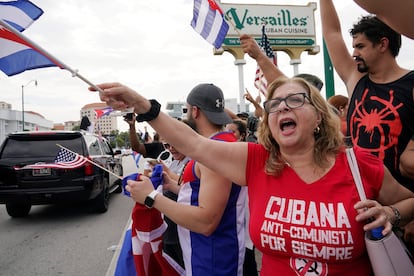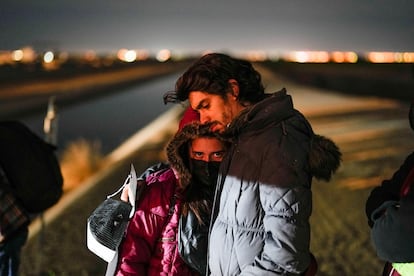From Obama to Trump: How two presidents precipitated the end of ‘Cuban privilege’ in the US
In the almost 60 years since the Cuban Revolution, never before have some 550,000 Cubans found themselves unable to legal status in a country that has traditionally welcomed them


Some say the end of the so-called “Cuban privilege” in the United States is rapidly approaching. This benefit — inherited from the Cold War era — has paved the way for Cuban immigrants to secure green cards and eventually U.S. citizenship for nearly six decades. Since the triumph of the Cuban Revolution, there has never been a time, until now, when approximately 550,000 Cubans in the U.S. have been unable to adjust their immigration status in a country that has historically welcomed them.
“This situation, once exceptional, seems to be getting closer and closer to that of other migrant communities,” says Jorge Duany, director of the Cuban Research Institute and professor of Anthropology in the Department of Global and Sociocultural Studies at the University of Florida. “For the first time in the history of the Cuban exodus, a large number of immigrants could be deported or forced to live clandestinely in the United States.”
There are countless personal stories that illustrate this shifting reality: a Cuban woman detained during a routine check-in with Immigration and Customs Enforcement (ICE) and sent to the Broward Transitional Center in Florida; a young man on parole who self-deported from Colorado to Villa Clara; a couple devastated after the man was taken in handcuffs to the Krome Detention Center, with no word on whether he’ll be returned to Havana; a young woman with an I-220A parole order, burdened by debt and unable to afford the thousands of dollars needed for legal representation; an elderly man, who arrived during the Mariel boatlift, now detained by immigration officers.
The consequences of current immigration policy are already taking a toll on the community: thousands face deportation orders, humanitarian parole statuses are expiring, political asylum requests are being denied, and many are left unsure of how — or if — they can regularize their status in the country.
This situation has become particularly unstable with the rise of Republicans to power, but, according to experts, it began not with the Trump era, but when Barack Obama ended the “wet foot, dry foot” policy.
Since the early days of the 1959 Cuban Revolution, Cubans were accepted into the United States through programs that protected them as refugees. But it wasn’t until 1966, with the implementation of the Cuban Adjustment Act signed by President Lyndon B. Johnson, that the exceptional treatment began — treatment that has allowed entire generations to avoid living illegally in the United States.
Initially, the law required a minimum stay of two years to obtain permanent resident status. A later amendment reduced that period to one year and one day, the amount of time after which they could apply for a green card. Unlike other migrants, Cubans were not required to enter legally, prove family ties or employment, or demonstrate that they would not become a public charge. On the contrary, for years, many arrived to find immediate access to food stamps, health insurance, some financial assistance, and job opportunities.
However, Michael Bustamante, a professor at the University of Miami and author of the book Cuban Memory Wars, notes that alongside this “privilege,” there have always been, in one form or another, elements of uncertainty within the Cuban community.
“The Cubans who entered in the early 1960s were granted parole — a legal but revocable status — with no path to permanence. After the passage of the Adjustment Act, the events of the Mariel boatlift demonstrated that the federal government still had the authority to declare more than 3,000 Cubans as excludable and detain them for years, or release them to await deportation,” Bustamante explains. “The majority of Cubans in that exodus were also unable to access the Adjustment Act until the mid-1980s, as a result of the ambiguity of the status invented for them: Cuban/Haitian Entrant.”

It was in 1996, under president Bill Clinton, that the “wet foot, dry foot” policy was introduced — the first major limitation to the Cuban Adjustment Act. This policy protected Cubans who managed to reach U.S. soil, allowing them to stay, but mandated the repatriation of those intercepted at sea.
In 2017, as part of efforts to restore diplomatic relations with then-president Raúl Castro, Barack Obama dismantled the policy, arguing that it no longer made sense in the context of improving ties between Washington and Havana. Castro welcomed the move, calling it “an important step in advancing relations” between the U.S. and Cuba. Since then, “Cuban immigrants have been subject to the same deportation practices as other migrant groups if they attempt to enter the United States without authorization,” says Duany.
During his first term, Donald Trump not only did not restore the “wet foot, dry foot” policy, but further restricted legal pathways for Cuban migration by shutting down consular services at the U.S. Embassy in Havana. When Joe Biden took office, he expanded alternative legal migration programs, such as the humanitarian parole system, which had already been extended to Haitians, Nicaraguans, and Venezuelans. This was part of an effort to manage the growing crisis at the southern border, even as thousands of Cubans were fleeing the island via Nicaragua — fueling the largest exodus in Cuba’s recent history.
Although the current wave includes the highest number of undocumented Cubans in decades, some still retain certain advantages compared to other nationalities. Those who have entered the United States legally — through visa lotteries, family reunification programs, or other means — have managed to adjust their status thanks to the continued protection offered by the Cuban Adjustment Act.
Why the differential treatment towards Cubans?
The so-called Cuban “privilege” has long raised many questions. The book Cuban Privilege: The Making of Immigrant Inequality in America by U.S. sociologist Susan Eckstein not only reignited the controversy a few years ago, but also stirred all kinds of resentment in South Florida, where a diaspora felt under attack.
In an interview with BBC Mundo, Eckstein insisted that the idea was not about “having those rights taken away, but rather extending them to others,” she said. “It’s hard to argue that Cubans deserve more than Haitians.”
The questions are the same ones that other communities in the United States are asking today: Are all Cubans political refugees? In a region where totalitarian regimes thrive, why isn’t this protection extended to other migrants? What underlies the differential treatment of Cubans today?
Many believe that it is not a matter of “privilege,” but rather of protecting people fleeing a country that violates their freedoms. For historian and essayist Rafael Rojas, it made “little sense to speak of privilege in the historical origins of the U.S. refugee and asylum policy toward Cubans,” with an Adjustment Act that “favored the residency process under the understanding that Cubans were fleeing a communist dictatorship.”
However, he believes that under current conditions — marked by mass displacement of Latin Americans— “it does make sense to speak of privilege.” “Cuban migrants, especially those with low incomes, increasingly share a sociological profile with Central Americans and Mexicans. Families fund their journeys, and the goal for many is to become remittance senders and, eventually, return intermittently to the island,” he says.

On the other hand, the idea of Cuba as the region’s only dictatorship is increasingly relative, says Rojas. “It was also the case during the Cold War, but dictatorships in the Southern Cone didn’t produce mass migrations like they do today. We are currently experiencing an increasingly widespread process of autocratization in Latin America, especially in Central America and the Caribbean. Within this broader authoritarian horizon, Cuba’s ‘privilege’ becomes more visible.”
Another question that arises in this context is what effect this situation might have on a community that voted overwhelmingly Republican. Guillermo Grenier, a sociologist at Florida International University who led the survey that gauges Cuban-American voters, believes it is difficult to determine whether it will have any impact on the midterm elections in 2026.
“The incumbent party typically loses significant support during midterm elections, but in the case of Cuban-Americans, it’s Republicans first and Cuban-Americans second,” Grenier says. “Losing the Cuban-American vote means voters either withhold their vote or vote for Democratic candidates. For the latter to happen, Democrats need to field some viable candidates. I don’t see any such candidates in districts currently represented by Cuban-American congressmen, but perhaps one will emerge.”
Although many Cubans now live with the anxiety that comes from having an irregular status, Bustamante believes that “they’re not going to be a priority on the deportation list. And under these harsh conditions, that could still represent a kind of ‘privilege,’ though a very diminished one, of course.” As long as the Cuban Adjustment Act exists, exceptional status will also exist. The question is whether this law could also be targeted by Trump, who is intent on ridding the country of millions of undocumented immigrants.
“Congress can repeal the Cuban Adjustment Act. All it needs is Trump’s OK,” Grenier says. “And since, in the grand scheme of things, Cuba is only important as an immigration issue, not a foreign policy issue, the Cuban Adjustment Act could be the next shoe to drop.”
Even if it remains in place, Trump could reduce the number of people who benefit from it by blocking the legal entry of Cubans. “The law could remain in place, but it wouldn’t have the same impact it had before. It doesn’t have that anymore, in fact,” Bustamante says.
Sign up for our weekly newsletter to get more English-language news coverage from EL PAÍS USA Edition
Tu suscripción se está usando en otro dispositivo
¿Quieres añadir otro usuario a tu suscripción?
Si continúas leyendo en este dispositivo, no se podrá leer en el otro.
FlechaTu suscripción se está usando en otro dispositivo y solo puedes acceder a EL PAÍS desde un dispositivo a la vez.
Si quieres compartir tu cuenta, cambia tu suscripción a la modalidad Premium, así podrás añadir otro usuario. Cada uno accederá con su propia cuenta de email, lo que os permitirá personalizar vuestra experiencia en EL PAÍS.
¿Tienes una suscripción de empresa? Accede aquí para contratar más cuentas.
En el caso de no saber quién está usando tu cuenta, te recomendamos cambiar tu contraseña aquí.
Si decides continuar compartiendo tu cuenta, este mensaje se mostrará en tu dispositivo y en el de la otra persona que está usando tu cuenta de forma indefinida, afectando a tu experiencia de lectura. Puedes consultar aquí los términos y condiciones de la suscripción digital.








































